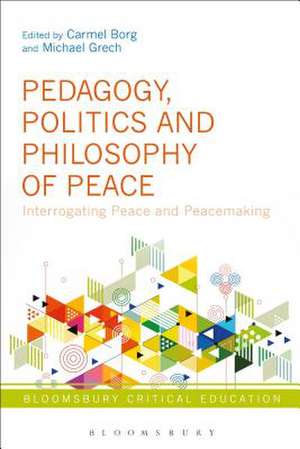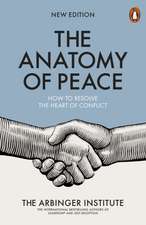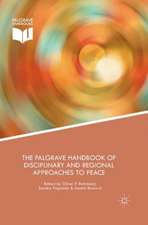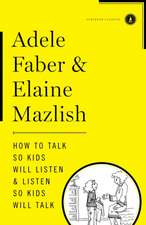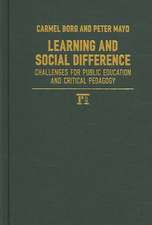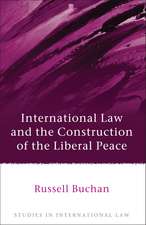Pedagogy, Politics and Philosophy of Peace: Interrogating Peace and Peacemaking: Bloomsbury Critical Education
Editat de Carmel Borg, Michael Grechen Limba Engleză Paperback – 22 aug 2018
| Toate formatele și edițiile | Preț | Express |
|---|---|---|
| Paperback (1) | 238.11 lei 6-8 săpt. | |
| Bloomsbury Publishing – 22 aug 2018 | 238.11 lei 6-8 săpt. | |
| Hardback (1) | 774.62 lei 6-8 săpt. | |
| Bloomsbury Publishing – 22 feb 2017 | 774.62 lei 6-8 săpt. |
Preț: 238.11 lei
Preț vechi: 305.93 lei
-22% Nou
Puncte Express: 357
Preț estimativ în valută:
45.56€ • 47.08$ • 37.90£
45.56€ • 47.08$ • 37.90£
Carte tipărită la comandă
Livrare economică 19 martie-02 aprilie
Preluare comenzi: 021 569.72.76
Specificații
ISBN-13: 9781350080966
ISBN-10: 1350080969
Pagini: 256
Ilustrații: 2 bw illus
Dimensiuni: 156 x 234 mm
Greutate: 0.38 kg
Ediția:NIPPOD
Editura: Bloomsbury Publishing
Colecția Bloomsbury Academic
Seria Bloomsbury Critical Education
Locul publicării:London, United Kingdom
ISBN-10: 1350080969
Pagini: 256
Ilustrații: 2 bw illus
Dimensiuni: 156 x 234 mm
Greutate: 0.38 kg
Ediția:NIPPOD
Editura: Bloomsbury Publishing
Colecția Bloomsbury Academic
Seria Bloomsbury Critical Education
Locul publicării:London, United Kingdom
Caracteristici
Explores the broader meaning of peace, beyond the concept of peace as absence of war and/or security, and the implications for pedagogy
Notă biografică
Carmel Borg is Associate Professor in the Department of Arts, Open Communities and Adult Education, Faculty of Education, University of Malta, Malta.Michael Grech is Assistant Lecturer at Junior College, University of Malta, Malta.
Cuprins
Notes on ContributorsForeword Introduction by the EditorsPart 1 The Contents of Peace 1. Where Does True Peace Dwell? Marianna Papastephanou (University of Cyprus, Cyprus) 2. Toward Critical Peace Education, Michalinos Zembylas (Open University of Cyprus, Cyprus) and Zvi Bekerman (Hebrew University of Jerusalem, Israel) 3. Critical Pedagogy as Teaching for Utopia, Maria Nikolakaki (University of Peloponnese, Global Centre for Advanced Studies, USA) 4. The Myth of the Impossibility of Peace and the Necessity of War, Clive Zammi (University of Malta, Malta) 5. In Search of Peace in a Culture of War, Antonia Darder (Loyola Marymount University, USA)Part 2 Challenges to Peace Education 6. Jerusalem is Lost, Michael Zammit (University of Malta, Malta) 7. Breathing Peace, Relating with the Other and the Maternal, Simone Galea (University of Malta, Malta) 8. The Limits of Exogenous Initiatives in Peace Making, Arsalan Alshinawi, (University of Malta, Malta)Part 3 Pedagogy of Peace 9. Critical Peace in the Digital Era of Austerity and Crisis, Nicos Trimikliniotis (University of Nicosia, Cyprus) 10. The Era of Liberal Peace and the Media Debates Around the Cases of Jyllands-Posten and Charlie Hebdo, Carmen Sammut (University of Malta, Malta) 11. Pedagogy, Politics and Humanistic Education, Linda Herrera (University of Illinois at Urbana-Champaign, USA) 12. Passive Revolution and its Contribution to the Study of Peace, Joseph Gravina (University of Malta, Malta) Epilogue Carmel Borg (University of Malta, Malta) and Michael Grech (University of Malta, Malta) Index
Recenzii
In a time when we are massively exposed to the premeditated devaluation and destruction of life in especially extra-western locations, Borg and Grech, along with their contributors, achieve a critical scholarly intervention that refuses to rescind the hope for genuine peace that should be rightfully accorded to all. As such, this book represents a uniquely original disquisition that should shift the way we think about peace and international relations; its arguments should persuade us to once again believe in the possibilities of viable and re-humanizing citizenships that affirm and improve the lives of people across the world.
This collection of essays offers an insightful multi-layered and multi-disciplinary theoretical reflection on the nature and meaning of peace and peace education as a critical moral imperative. In doing so, the collection makes a significant contribution to the philosophy of critical peace education.
In an era of normalised war and conflict it becomes almost impossible to conceive of an emancipatory ethics of peace as anything other than a pipe dream. In this collection, peace is understood as the absence of conflict and as the experience of justice between people and between nations - a conceptualisation which magnifies the enormity of the task of turning dreams into reality. But it is precisely because of the scale of the challenge that we need critical pedagogical books like this that can step outside the despair of everyday assumptions and inspire and challenge us to think and act differently and at the same time make hope for a world at peace convincing.
This collection of essays offers an insightful multi-layered and multi-disciplinary theoretical reflection on the nature and meaning of peace and peace education as a critical moral imperative. In doing so, the collection makes a significant contribution to the philosophy of critical peace education.
In an era of normalised war and conflict it becomes almost impossible to conceive of an emancipatory ethics of peace as anything other than a pipe dream. In this collection, peace is understood as the absence of conflict and as the experience of justice between people and between nations - a conceptualisation which magnifies the enormity of the task of turning dreams into reality. But it is precisely because of the scale of the challenge that we need critical pedagogical books like this that can step outside the despair of everyday assumptions and inspire and challenge us to think and act differently and at the same time make hope for a world at peace convincing.
